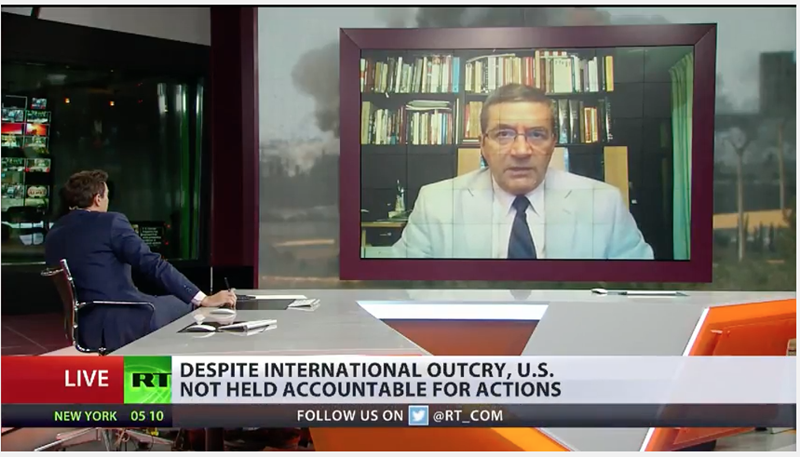In his latest RT interview (October 11) Srdja Trifkovic discusses the politics of distinction between war crimes and collateral damage. He says that atrocity management in Syria may be an introduction to intervention in the name of the “Responsibility to Protect,” a doctrine applied in accordance with the intervening power’s preconceived geopolitical and military objectives.
RT: Let’s look into [the Syrian war crimes issue] with Srdja Trifkovic, foreign affairs editor for Chronicles magazine. Is the U.S. in any position to point the finger over war crimes? We know that their own air strikes have exacted a deadly price in Syria . . . In September 62 Syrian soldiers were killed, some 40 people were killed in two raids back in July in Manbij.
ST: Of course it’s not, in terms of a rational and moral world. On the other hand, intoxicated by their own brew of American “indispensability” and “exceptionalism,” the leaders of the United States do not have a sane understanding of these issues, and judge them on ad-hoc basis: out friends and we ourselves never commit war crimes, the other side does it all the time.
RT: Where do you think the line, then, is drawn between war crimes and collateral damage? In essence, who decides that?
ST: There is a very important term, “deliberate targeting.” If you are out to get a hospital, or another civilian target—like a passenger train, during the NATO bombing campaign in Serbia in 1999; or if you drop cluster bombs on a crowded market, like they did in the city of Nish during that same campaign—then it is evidently a war crime. On the other hand, the designation “collateral damage” is most of the time decided upon by the person speaking. We do not have an objective yardstick, we do not have an objective body to judge: the experience with international jurisprudence over the past two decades is abysmal. The Hague Tribunal for the Former Yugoslavia has been turned into a weapon of NATO and the United States . . .
RT: Can I just throw another aspect into the mix here? A German magazine has exposed that while presenting evidence of Russian airstrikes in Aleppo, the French delegation to the UN used a photo taken in Gaza back in 2014; do you think that could have been a genuine mistake, or a deliberate effort to actually mislead?
ST: I think it’s a deliberate effort by someone lower down the scale, and then at the top they swallowed it hook, line and sinker. But it happens all the time: during the Bosnian war 1992-95, we’ve seen any number of pictures with the same message—for instance, a woman in black kissing a cross at the grave, and the caption was “Mother mourning her Muslim son in Sarajevo.” It’s absurd. It is what I would call atrocity management. It is always an introduction to a more sinister scenario, which entails intervention in the name of the nebulous doctrine of “Responsibility to Protect.” That doctrine is, of course, only applied in accordance with the preconceived geopolitical and military objectives.
RT: According to the UN, since Saudi air strikes started last year some 4000 civilians have been killed in Yemen. We are not seeing a lot of media coverage, we know that the U.S. and the U.K. are supplying the Saudis with weapons. Why are there not louder calls for a probe into potential war crimes in this case?
ST: It is not only because Saudi Arabia is considered an ally of the United States. It is also because both the United States and its West European allies are literally afraid of the Saudis, who have an enormous financial clout. They are among the biggest purchasers of American and West European arms, and they also supply lots of oil to Europe. In addition, they also control a network of hundreds, if not thousands, of Wahhabist Islamic centers, mosques and schools all over the Western world. It is an extremely inconvenient target for investigation, quite apart from the fact that there is a strong Saudi lobby in Washington, which is hellbent on protecting the Kingdom. We may also mention the treatment of the Kurds in southeastern Turkey. Yesterday’s London Independent had a depressing article by Robert Fisk describing the situation in Diyarbakir. It is exactly the same as Aleppo, except that it is even less reported than the Saudi actions in Yemen.
RT: We’ve been speaking to Srdja Trifkovic, foreign affairs editor at Chronicles magazine; thanks for coming on the program at this hour, Srdja.



Leave a Reply